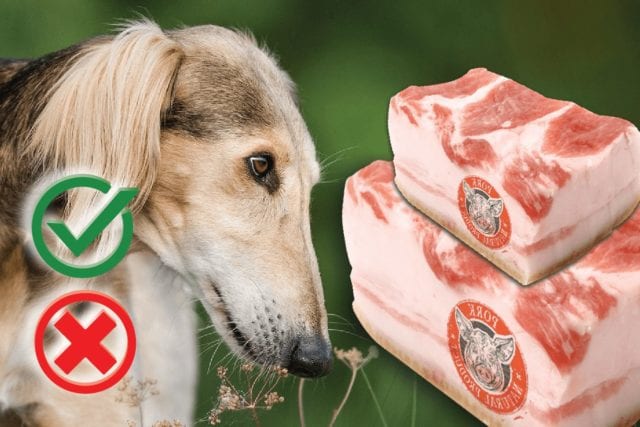Lard is a very tasty but also very fatty food, so it is not suitable for our dog’s diet. In addition, it is the product of a particular process with which it is enriched with salt and spices that are not healthy for our four-legged friends.
What is lard and how is it made?
Nutrition for our four-legged friends is important and should never be taken lightly. Wondering if dogs can eat lard and other foods is legitimate, because we need to make sure they eat healthy foods that are good for them. In this sense, lard is not a good choice for dogs, and for several reasons.
First of all, let’s see how lard is made. Lard is very tasty, we cannot deny it, and it cannot be missing from the tables. It’s part of the pig that is processed with ancient salting and flavoring techniques, as well as seasoning.
All this leads to a first conclusion that must make us understand why dogs cannot eat a food like lard. To be precise, the layer of fat used to produce it is the one found just under the skin of the pig’s neck, back, and hips. But to make it soft and tasty, it is covered with salt and spices.
In short, the lard is good and succulent and any four-legged friend would not even think about it for a second before flinging itself on it. But taste does not always go hand in hand with health, and it is because of all the ingredients with which it is prepared that lard should not be included in their diet.
Too much salt is bad for dogs
In general, we should avoid all seasoned foods that are filled with spices and especially salt for the same reason. For centuries, salt has been the ingredient that allows meat to be preserved for a very long time and is also used for some types of fish. But dogs cannot ingest large quantities because it’s bad for them and can cause quite a few health problems.
This is not to say that dogs have to eat tasteless foods, because otherwise, it would be really sad! Just like a human’s diet, we can use it to season our dishes but without exceeding.
Dogs need to ingest salt but in small amounts, just enough to balance electrolytes and fluids and also to get the nerves working properly. In fact, dog foods contain sodium, just enough for the body to function. If we give too much to our dogs, a series of serious health complications can arise.
You may not know that there is even salt poisoning that causes so many ugly and annoying, even dangerous, symptoms. When dogs eat too much salt the first thing we can observe is that it starts drinking large quantities of water, much more than usual. After that, it appears tired and weak, has a swollen tummy, and in severe cases, vomiting and diarrhea.
It can even go as far as to have tremors and convulsions, symptoms that clearly indicate that something is wrong.
Lard and spices: let’s be careful
As we have seen previously, lard is not simple natural animal fat but is processed and flavored with salt (which is mainly used for preserving the product) and with spices. Here is another reason why dogs cannot eat lard, precisely because of these “natural flavorings” which are as good as they are potentially harmful.
Not all spices are bad for our dogs and indeed some aromatic herbs can draw numerous benefits. By using it in small amounts, even in addition to a meal, we can even prevent some health ailments.
Just to give an example, lard is generally seasoned with rosemary and sage which are two herbs that are good for dogs. They have anti-inflammatory and antioxidant properties, facilitate digestion and among other things are useful for calming spasms and convulsions for dogs who suffer from them. So in this sense, the spices of lard are not harmful, the situation changes when we talk about nutmeg, for example.
The nutmeg is an ingredient for the preparation of fat, especially the cigar, but not good for dogs. Indeed we can say that it is even psychotropic, it causes damage and reactions from the nervous system of dogs.
This happens because it contains a substance called myristicin which causes hyperstimulation of the nerves, with all the serious consequences of the case. Myristicin can even lead to a hallucinatory state, just as if it were a real drug. So let’s pay close attention to nutmeg!
Dogs and fats: what to know
When we talk about lard, our mind can only focus on one word: fat. Lard is fat, and it is produced with the natural lipid layer found under the pig’s skin. In general, it is not forbidden to give natural fat to dogs, but in specific situations especially to dogs that carry out heavy activities and require a large consumption of energy.
Just take the example of hunting dogs, during the hunting season the owners/hunters often give natural fat of animal origin to their dogs. But these are extraordinary situations, in everyday life, consuming all this fat for a dog who lives at home and is limited to games and walks is absolutely harmful.
A dog’s diet must contain the right amount of proteins, fats, vitamins and minerals, few carbohydrates but all absolutely balanced according to its lifestyle, its specific needs, and its health conditions. Before adding any ingredient to our dog’s diet, we must consult with the vet and understand if certain foods can harm it or have any benefits.
This article is purely informative, at Shelterapet we do not have the right to prescribe veterinary treatments or make any type of diagnosis. We encourage you to take your pet to the vet in case of any kind of discomfort.


